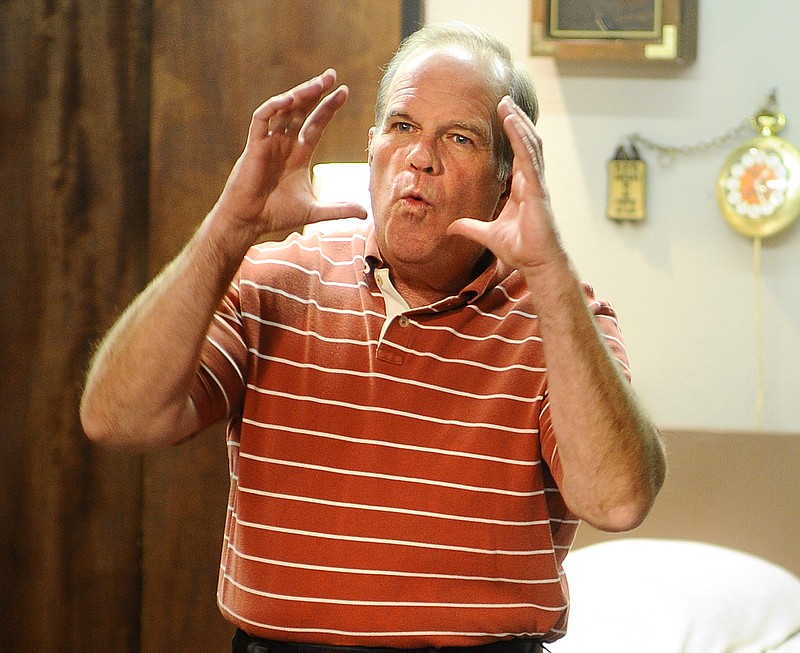Alan Bailey is a man of contradictions.
He's a man of the cloth who loves rock and roll. He's a self-effacing individual who blooms in the spotlight. And, although he was raised in a few of the world's most exotic locales, he has spent his adulthood in slow-paced Jefferson City.
Most people probably know Bailey as a frequent contributor to the Capital City's theater scene, helping with dozens of productions over the years as a stage hand, actor and director. He said it's tougher getting roles as he's aged, but he's been cast in two upcoming productions, Scene One's "Women of Lockerbie" and Jefferson City Little Theatre's "I Hate Hamlet."
Bailey said the theater scene in Jefferson City has grown over the years, expanding to four lively companies today.
"There's so much theater here now," he marveled.
Bailey was born in 1952 in Birmingham, Alabama, to a couple that yearned for international adventure.
When he was 4, his father accepted a job as an accountant for the U.S. Agency for International Development, an organization that provides development and humanitarian assistance around the world.
The family lived in Japan for more than five years before returning to the states. By the time Bailey was in the fifth grade, the family had moved again, this time to Kabul. In those years before the Soviet invasion, the Afghan capital had yet to experience decades of war, but it was still a tough place for Bailey.
"It was rough for me. My mother got very, very sick with hepatitis - jaundice - and she had to be medivac'ed out of the country. It was a "unique' experience," he said.
He spent part of junior high in Arlington, Va., before his family bought a home in Bowie, Md.
"It was the first home I knew," he said.
But when he was a junior, his dad came home and announced: "We're going to Pakistan!"
Bailey said, despite the hardships, his mom never resented the gypsy lifestyle.
"She grew up in a coal-mining camp in Alabama," Bailey said. "She knew what she was getting into."
Those years he spent in Lahore were some of the "most exciting, pleasurable" years of his life, Bailey said, partly because he bonded with so many friends in the expatriate community from across the globe. He graduated with a small class of 26 students in 1970.
"I still keep up with some of those folks because of Facebook. It's been very, very nice," Bailey said.
Although exhilarating, those years were also some of the most dangerous of his life. He was there for a portion of the Indo-Pakistani War.
"I remember watching the shells come in over the flat roofs of the city and tanks rolling up and down he streets," he said.
He also remembers breaking curfew and barely escaping arrest by a Pakistan police officer.
In Lahore, most of the family's food staples - with the exception of fruits, which his mother scrubbed in an iodine solution - came from the commissary. To this day he despises powdered milk.
He said his experiences overseas gave him a deeper appreciation for his own country.
"There are so many things we take for granted," he said. "It gave me a different world view. I know it would never happen, but I think it would be very valuable for young (Americans) to live in an undeveloped country for a time."
Upon graduation he made a decision to attend college in Natchitoches, La., for little better reason than his brother was already enrolled. But it turned out to be a fated decision because he met Linda, his wife of 39 years, there.
"We were planning a trip to a football game. It was a fix-up ... a blind date. And I was smitten," he said.
Not only did Bailey fall in love with Linda, he also fell in love with her family's religious traditions. In 1973 he made his confession of faith in the Baptist Church. The couple married in 1974.
Bailey, a political science major in college, originally believed he wanted to be a lawyer, but decided on public administration instead.
A printed advertisement on a university bulletin board sent his life in a totally new direction: the University of Missouri.
"I have no money," Bailey told his new advisor.
"It shouldn't be a problem," the man told him, and offered him a stipend for an internship with the Center for Aging Studies.
Nine hours of social gerontology classes led to an internship with the Central Missouri Area Agency on Aging which led to a job with the state of Missouri.
Although he changed jobs a few times during the early years of his career, Bailey finally settled for 15 years as a marketing manager for the Missouri Consolidated Health Care Plan.
He retired in 1995. But he wasn't still for very long.
"In 1996 or 1997 I got called to ministry in Tipton," he said. "When God calls, you go. That's the first two letters of God ... "Go.'"
Today he serves as the pastor of Auxvasse Christian Church (Disciples of Christ), a small congregation with daily Sunday attendance of 30 to 40 individuals. Although it's quite a long drive to Auxvasse, Bailey hasn't considered finding a congregation closer to home.
"God has led me," he said. "You have to do your best to listen to what God is telling you to do."
He believes God is calling humans to be less self-absorbed and more drawn to helping one another.
"Be available, be open," he said.
For the most part, Bailey said he draws his ideas for sermons from the Lectionary, a series of planned readings on a three-year cycle.
"Sometimes I am led somewhere else in the Bible, because of what's happening in the world or in my life," he said. "It's exciting. I personally believe every human has a spiritual piece that too often we want to deny."

